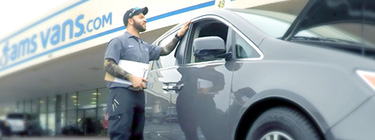Disability Vans for Commercial Use
Commercial handicap vans are used by many organizations to transport people with disabilities. This is a growing business in many communities with large senior populations. The Americans with Disabilities Act includes provisions for safe and secure transportation for people with mobility handicaps.
Organizations using commercial handicap vans include:
Hospitals for non-emergency transportation
Nursing homes and rehabilitation facilities
Assisted living communities
Senior centers
Recreational facilities for people with disabilities
Hotels and resorts, especially those with spa facilities
Shared ride services including airport shuttles
Educational institutions
The vans must include ramps and secure tie downs for wheelchairs along with accessibility for other passengers. This includes passengers who use walkers, crutches, and other mobility aids. In addition, handicap passengers may also use oxygen. A commercial van should have the necessary accommodations. Commercial and personal wheelchair vans are typically roomy enough for the driver, one wheelchair, and as many as four additional passengers, unless luggage or cargo space is required. Some commercial handicap vans may be fitted to accommodate more than one wheelchair passenger and fewer walk-in passengers. The access ramp can be either side entry or rear entry. Commercial disability vans must be sturdy and built to accommodate as much as 1,500 lbs.
Compliant with ADA Standards
The ADA-compliance guidelines for personal use began as modifications to public transportation vehicles, namely busses, streetcars, trains, and non-emergency medical transport vans. These guidelines eventually extended to manufacturers of personal vehicles sold at dealerships throughout the United States for personal and business use.
The revised, enforceable accessibility standards called the 2010 ADA Standards for Accessible Design outline specific characteristics for wheelchair vans. The ADA Standards for Accessible Design are usually necessary for insurance coverage for commercial van transportation for disabled people. The standards focus on several specific points for the safety and security of disabled passengers. A few elements of ADA regulations include the following unique comfort and safety features:
Lift door height. 56" door opening height
Handicap lift. 30" x 40" wide clear platform
Wheelchair attachments. Able to withstand 2,500 of pressure per leg
Seat belt mechanism. 4 pt. tie downs with lap and shoulder belt
Interior lighting. One foot candle of illumination
An ADA-compliant wheelchair van follows these strict design guidelines throughout the vehicle. Commercial vans for wheelchair passengers are also used by people with other types of mobility aids. This includes the ramp that can be lowered to accommodate a person with a walker who has difficulty with steps. The walker is usually folded and stored while the person is in the van, but it is used to enter and exit the vehicle.
Types of Commercial Vans for People with Disabilities
Many US and foreign automobile makers have disability vans that can be used for business transportation. Dodge, Toyota, Honda, and Chrysler all have vans with side door ramps that can be used as commercial vehicles. The business using any of these vans can have its name painted on the vehicle.
The vans with side door entry are the most popular. The door and the ramp are controlled remotely. Wheelchair passengers find it easy to enter and exit the vehicle. The vans can accommodate manual or electric wheelchairs. Vans that are not in complete compliance with ADA standards can be modified to meet all regulations for commercial use. This may be necessary to comply with state regulations along with the US Department of Transportation requirements if the disability van service crosses state lines. The US has a population that is growing and aging. There are numerous older people who depend on wheelchairs for mobility. This presents an opportunity for entrepreneurs who want to provide an accessible transportation business. This includes disability vans for seniors in smaller towns in addition to the larger metropolitan areas.
AMS Vans offers a wide selection of ADA-compliant handicap wheelchair van options for commercial use. We make sure that a new or used van meets the ADA's most stringent requirements for safety and quality for commercial transportation services. This includes minivans used by ride-share companies.
Contact us for more information on new and used vans that will provide comfortable and safe transportation for people with disabilities.


